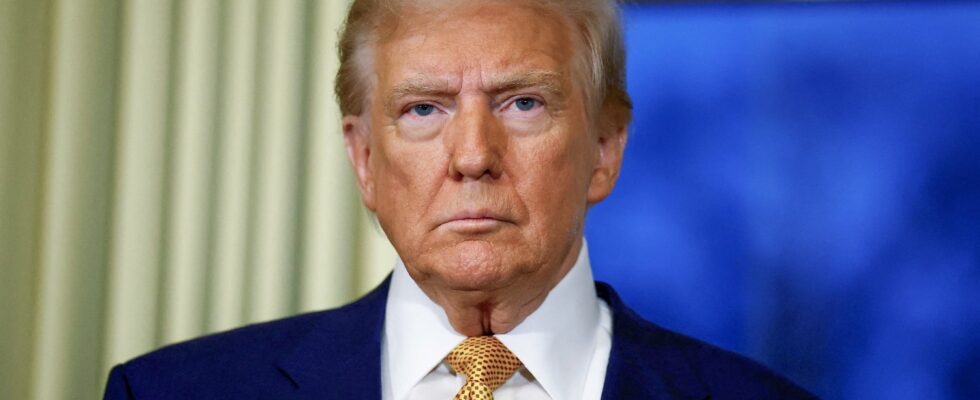“This time, it’s not a joke,” says the New York Times. About ten days before the inauguration of Donald Trump, the next president of the United States, the American press is taking seriously its declarations assuring it to consider using force to take control of Greenland and the Panama Canal, and to carry out an economic policy so aggressive towards Canada that its neighbor would have no choice but to accept its annexation.
“Canada and the United States would really be something. You get rid of this artificially drawn line and you look at what it looks like. It would also be much better for national security,” assured Donald Trump during a press conference outlining future American foreign policy, Tuesday January 7. Comments which add to his proposal, during a meeting at the end of December, to recognize the Mexican cartels as “terrorist organizations”, a measure which would make military intervention possible, as denounced by the local daily Milenio.
“Geopolitical turning point”
This hawkish speech does not fail to provoke a reaction even in conservative circles, who fear that this aggressive policy will destabilize the United States’ game of alliances. “If Donald Trump achieves even part of what he has described, it could lead to profound changes in America’s global role, emboldening adversaries and forcing allies who are no longer assured of support of Washington, to seek new security and economic arrangements”, deplores the Wall Street Journal.
“It’s very autocratic, and that’s why what Trump says and the way he acts is so worrying,” denounces Chuck Hagel, former Republican senator and secretary of defense under the Obama administration. Without going so far as to accredit the thesis of a military intervention, the New York Times considers Donald Trump’s expansionist desires to be very real, and is wary of “the instinct of a real estate developer who suddenly has the most significant military power in the world to support his negotiation strategy”.
Vital territories for “economic security”
Since 2019, the businessman has been talking about an acquisition by the United States of Greenland – a country on the North American continent belonging to Denmark – although its leaders have refused on numerous occasions. The largest island in the world is indeed attracting interest thanks to its strategic position, as the melting of ice in the Arctic opens up new naval opportunities, as well as for its oil and rare metals, which arouse the covetousness of China and Russia. The United States, which has a military base in southern Greenland, would like to counter its growing influence in the Arctic.
For analysts, the most likely way for Uncle Sam to achieve such a rapprochement would be an expansion of his presence through economic investment, and a larger military footprint. Among the hypotheses, the Wall Street Journal evokes “a possible free association agreement” with the island “which would make it possible to negotiate expanded economic and military ties, without Denmark having to renounce its sovereignty”.
Recover “the gift” made in Panama
Donald Trump’s dreams don’t stop there: the billionaire also wants to regain total control of the Panama Canal, which connects the Pacific Ocean to the Atlantic, and through which 200 million tons of goods pass each year. Returned to the Central American country in 1999, the waterway is currently administered by the state-run Panama Canal Authority, but several of its seaports have since been managed by a Hong Kong-based company.
The American president, whose country is the first user, also believes that the customs tariffs imposed on him are “a total scam”. Donald Trump’s advisers are reportedly considering solutions to recover “the gift” given to Panama, such as including the country in existing trade agreements and more investment in the country, in exchange for a full resumption of control of the canal.
“Expansionist tradition”
Finally, Donald Trump would dream of seeing a 51st American state, and thought of Canada. The billionaire, who for weeks has accused his neighbor of not playing the game of funding NATO, or of not sufficiently securing his borders, has threatened new customs sanctions. He also hopes that these will lead the 40 million inhabitants of Canada to consider joining the United States. But for his resigning Prime Minister Justin Trudeau, “there is not a shadow of a chance that Canada will be part of the United States,” he replied on X.
A set of projects which demonstrate, for the New York Times, that, far from being purely isolationist, Donald Trump’s foreign policy is in line with those of expansionist heads of state. The idea of expanding the territory by purchasing land is not new: the United States already did it in 1803, by acquiring Louisiana from France for 15 million dollars, or again in 1867, by purchase of Alaska from the Russian Empire for 7.2 million.
Other presidents have already proposed acquiring Greenland, like Harry Truman, who during the Cold War offered $100 million to recover this territory. In a purely hypothetical exercise, the Washington Post on the other hand, estimated in 2019 that the purchase of Greenland could today cost up to $1.7 trillion, taking into account the island’s industries and natural resources.
The newspaper nevertheless puts Donald Trump’s “bluster” into perspective, which aims above all “to obtain leverage before negotiations” with these various states. “Those who worry about the possibility that Trump will actually do what he says” should be remembered, says the conservative daily, “of his proposal during his first campaign for the White House, to make Mexico pay for the wall he wanted to build along the border. The project turned out to be a failure.
